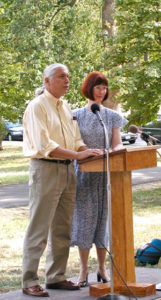Eli Siegel Explained Love
By Margot Carpenter & Robert Murphy
One of the greatest contributions to humanity is Eli Siegel’s understanding of love. What love is and why it fails have eluded people for thousands of years, but no more! The purpose of love, Mr. Siegel stated, is to like the world. Through loving another person, we should care more for everything — our families, justice, objects, history, books, the feelings of people near and far. We’ve studied and taught this principle for over thirty years, and seen, without exception, it is true, and it meets people’s hopes to love another and feel they deserve to be loved.
Mr. Siegel showed that love fails because we use a person to get away from and even despise the world. Both of us once saw love as a haven from a dull, often cruel world — where we could be adored and superior to everyone. Then in Aesthetic Realism classes, Mr. Siegel taught us that this contempt was the cause of the fighting, sarcasm, and hopelessness we thought inevitable in love.
We heard beautiful questions. For instance, he asked me [Margot Carpenter]:
“Do you see a man as someone to know or to show off with?”
“What do you want to depend on — who you are or how pleasing you can make yourself?”;
and
“Do you want to manage a man or use him to see the whole world better?”
And Mr. Siegel asked me [Robert Murphy]:
“Do you use a woman to feel you have a victory over the world?”
“Do you believe you deserve to have a woman like you?”
Love, Eli Siegel taught us — and people learn in consultations — is good will: “the desire to have [another person] stronger and more beautiful, for this desire makes oneself stronger and more beautiful.” It’s the oneness of approval and criticism — not unconditional approval. Because we love someone, we want to see that person exactly, be intensely for the best thing in them and against where they are unjust, so they can be “stronger and more beautiful.”
We love Eli Siegel for his honesty, his courage, his immense knowledge and personal kindness, which we saw firsthand and which shine through everything he wrote. He brought sanity and dignity to love and showed its relation to all culture, science, and art.
See Statements by Other Speakers
1. ADDRESS by Ellen Reiss Aesthetic Realism Chairman of Education
On Eli Siegel’s historic understanding of:
2. EDUCATION — Lois Mason & Rosemary Plumstead
3. RACISM — Dr. Arnold Perey, Monique Michael, Allan Michael, & Dr. Jaime Torres
4. ART — Dorothy Koppelman
5. LABOR & ECONOMICS — Timothy Lynch
6. LOVE — Margot Carpenter & Robert Murphy
7. STATEMENT by Chaim Koppelman, Sculptor & Designer of Memorial
♦ Brief biographies of the speakers & other participants.
♦ Mayor’s Proclamation | Governor’s Proclamation | In the U.S. Congressional Record
.
